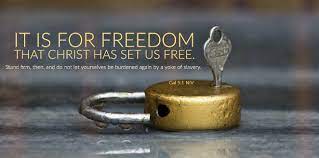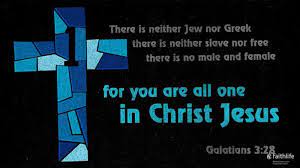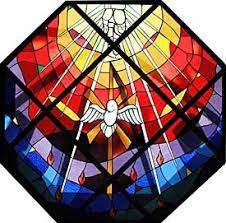Reflection: "Freedom and Fruits"Approximately 3,000 years before Sir William Wallace fought for Scottish freedom from the English oppressors and Thomas Jefferson drafted the Declaration of Independence, which gave the American people freedom from their British overlords, the Hebrew people were suffering under bondage in Egypt.
Oh, how they yearned for their freedom. God sent them a shepherd named Moses, who demanded of the Pharaoh, "Let my people go!" Even though Pharaoh initially refused, God prevailed and delivered his people from captivity. But, heaven forbid, nearly 1,000 years after Moses, God’s people were again being oppressed - both by the tyranny of the Roman Empire and by the powers and principalities of the world. This time, God sent his son, Jesus, to live in the world and to show them how to be free again, but in a different way. In his inaugural sermon, Jesus announced that he had been anointed by the Holy Spirit "to bring good news to the poor, to proclaim release to the captives and to let the oppressed go free." This same liberating Jesus would later say to his followers, "If you continue in my word, you are truly my disciples, and you will know the truth, and the truth will set you free. . .so if the Son makes you free, you will be free indeed." Therefore, we see that freedom is an idea that emanates from the very heart of God. In the beginning, when God created humankind, he could easily have made us like puppets, so that whenever he wanted us to do something, he could just pull a string and we’d have to do it. But what kind of relationship would that be? Instead, God created humans with the capacity and the responsibility to act as free moral agents. The desire for freedom isn’t simply a function of the human spirit, its source is the free will of the Living God. There are more than fifty references to freedom in the New Testament, each of them exploring a different dimension of what Paul calls, in his letter to the Romans, "the glorious liberty of the children of God." In his letter to the Galatians, there is a less-than-glorious atmosphere surrounding the subject of freedom. It seems as if the church in Galatia had divided into two opposing camps. There were those who believed that freedom meant license to do whatever they pleased - and those who were entrenched in the Jewish way of things. In the First Century, there was a small group of Jews who were known as the Gnostics, who believed that the human spirit was free from matter and flesh. Their belief was that whatever you did during the time you were alive, was of little consequence in the afterlife. Therefore, they reasoned, you may as well do whatever you please with your body while on earth, because your soul will still be pure and, consequently, you’ll be ok when you get to heaven. Responding to these words, Paul said "Don’t use your freedom for self-indulgence, but through love, become slaves of one another, for the whole law is summed up in this single commandment: Love your neighbour as yourself." The other camp in the Galatian church was made up of those who thought it imperative to adhere to all the requirements of Jewish religious rituals, including dietary restrictions and male circumcision. That crowd would have said that freedom in Christ was all well and good, but that they felt much more secure remaining inside the old prison of the hundreds of regulations that characterised the Mosaic (Jewish) law. Paul was passionately convinced that observing the rituals, or not observing them, really was actually of no consequence, because "The only thing that counts is faith, working through love." To be free really means to be liberated from the prison of "I, myself, and me". To be truly free, is to be able to move beyond the self and to move into the risk of love and to give yourself to the demands of service, free for responsibility, not from responsibility. Think of how Jesus, who could have had everything - power, status, safety – should he want it, instead chose to empty himself and take on the role of a servant – all for the sake of the world. Now that’s true freedom. Think of how God made us as one human family, irrevocably bound to one another in his heart and mind - from the very beginning - so that we are, by nature, inclined towards loving one another. By the will of God, and through the power of the Holy Spirit, freedom and responsibility belong together in our lives and in the life of our congregation. The same is true, I believe, for our nation. One of Australia's greatest gifts to its people, is the concept of religious freedom. Governments don’t impose religion on anyone, and all our citizens are free to practice religion, or not, according to their own wishes. But that doesn’t mean that people of faith don’t have a crucial role to play in the life of our nation. We ought to be working every day to create a society that’s marked by concern for the common good. We ought to be listening for the voices of those who aren’t being heard. We ought to be speaking out against excessive self-indulgences and greed. I believe that we’re called to be a servant people, bringing good news to the oppressed, modelling justice and proclaiming liberty to the captives. Can you even think of a time that calls out more for moral leadership, than in these troubled days? What an opportunity we have, what a responsibility we have - to repair, to raise up, to build up, to offer hope for all those who suffer in our midst and beyond our shores. Sisters and brothers in Christ, may our pledge today be to build that kingdom, here on earth, just as it is in heaven. And the Good News is that, through Christ, we’ve been set free to do all these things! And we’re free from having to work out how to achieve our own salvation! We’re free from what binds us! We’re free from the past - from our fears and our anxieties. Freedom is ours! And we’re saved and empowered! Paul reminded the Galatians that the fruit of the Spirit is love, joy, peace, patience, kindness, generosity, faithfulness, gentleness, and self-control. If we live by the Spirit, then we are also guided by the Spirit. We’re free and now we need to exercise our freedom to love and serve one another unconditionally. We’re liberated to love. So what’s stopping us from exercising the freedom we have? Maybe we feel that to love means to miss out ourselves, however it’s not a game of pluses and minuses. To love others doesn’t necessarily result in less love for ourselves. Maybe another reason that we recoil from our freedom, is that it comes with responsibilities. We have the freedom to choose, but are we afraid of the choices we’ll have to make? Is it easier to rely on rulebooks and authorities to tell us what to do, as the early Jews did? Obviously, at a material level, to love and to give of our time, money and possessions, results in us not keeping these things just for ourselves. However, at a spiritual, non-materialistic level (which is what ultimately matters), to share and to love, results in our lives becoming richer, more rewarding and more meaningful. I pray that you will all dwell richly in God, claim your freedom and live a life fully of love. Pastor Rick
1 Comment
Reflection: "One in Christ"In the 3rd Chapter of Galatians, we encounter a dramatic shift of focus.
Up until now, Paul has been talking in the first-person plural ("we"), when describing the past experience of the Jewish people, who were, in his words, "locked up" under the Jewish laws. Now he turns to the privileged position of the Galatian Christians who are all united in Christ (you are all . . . all of you . . . you are all), Union with Christ is the main emphasis of each verse: “faith in Christ Jesus (v. 26), baptized into Christ, clothed with Christ (v. 27), one in Christ Jesus (v. 28), belonging to Christ (v. 29).” This sharp contrast between the negatives under the system of Mosaic law and the positive privileges of union with Christ, reinforces Paul's rebuke for their foolishness at the beginning of the chapter. In the old set of relationships, under the law, Jews thought of themselves as the children of God and that the Gentiles were sinners. But now Paul tells them that Gentile Christians are: “all sons of God through faith in Christ Jesus.” This must have been a shocking declaration for a Jew to hear. In Jewish literature, “sons of God” was a title of highest honour, used only for the members of the righteous tribes. But now Gentiles - the rejected, the outsiders, the sinners, those who do not observe the law – are also called “sons of God.” How could a Gentile ever be called a child of God? Paul's answer is clear – “through faith in Christ Jesus (v. 26)” So, we now see that all who believe in Christ are equals. Did you know that until about seventy or eighty years ago, in some churches, men sat on one side and women sat on the other? Why? Perhaps this was an established rule, and no one was game to question it. It probably sounded like a good deal for men - not having to care for a pew full of active children. Mums got to do all that themselves - things were different in those days. We now understand the folly of those rules. But are there still things which divide us from other Christians? One of the deepest concerns on the heart of Jesus, on the night he instituted the Lord's Supper in the Upper Room, was the unity of his followers. In John 13:35 we read "...everyone will know that you are my disciples, If you have love for one another." Not once, but three times that evening he commanded his disciples to, "...love one another...." It’s not just that mutual love and unity in the church is a nice thing, it’s an absolutely essential thing for the witness of the church in the world. In writing to the fledgling church in Galatia, Paul declares that when we are incorporated into Christ through baptism, all distinctions between us have been removed. "There is no longer Jew or Greek," Paul says, "There is no longer slave or free, there is no longer male and female..." Why do you think he says that? It’s because "all of you are one in Christ Jesus!" What do you think Paul would say if he came back today and saw somewhere in the neighbourhood of 6,000 competing groups on this planet - all claiming the name of Christ? Ok - many groups work together and acknowledge each other's legitimacy as Christian churches, but the fact is that there are hundreds of groups, including "fringe groups" that claim to be the "one true church." And there are millions of individuals who feel that their church is the only "true" church. What must this be doing to the heart of Christ? As the unity of Jesus with his father was the foundation of the gospel call - so too the message of reconciliation with God rests on the unity of the Body of Christ – the church. Today’s unbelieving world has no way to see the reality of the good news if the witness of Christ’s church is buried in the rubble of division and disunity. What an awesome responsibility has been given to us as members of the church of Christ. Our unity is not for your sake, or my sake, or for the sake of a jolly fellowship, where a good time is had by all. No - our unity in Christ is a command by Christ that we must obey and a passion of Christ's that we need to embrace. It probably wouldn’t be a stretch to label this call of Christ "Mission Impossible." It seems most unlikely that the church will get to a point where it has the kind of unity that Jesus commanded and prayed about so often. History is filled with the divisions of Christianity and with the horror of persecution, burnings at the stake, hangings, executions and holy wars – and all in the name of Christ. Thanks be to God that Christianity is pretty much done with the burning and hanging of heretics (although there is still some ugly religious persecution going on in our world) - but there is a long way to go before we might see the "Oneness in Christ" that Paul wrote about. The reading from Galatians will help us to get a handle on the meaning of this "Oneness in Christ." We need to be clear that the "oneness" Paul writes about here is not a simple kind of unity where everyone cooperates and "gets along." It’s not to say that this kind of unity is a bad thing - mutual respect among people of different races, classes, cultures and religions is an absolutely admirable cause to work for. If the human race could just get together on a decision agreeing that there would never again be a "Holy War," most Christians would fall on their knees and give thanks and glory to God. But - this is not the type of unity Paul is speaking about in our reading. His words, "...for all of you are one in Christ Jesus..." are addressed to a Christian people whose church was in danger of being torn apart and Paul addresses that danger by speaking about the foundation, the reality and the future of Christian Unity. The importance of God's call to us today is highlighted in the comment that was made a few years ago by an unchurched, non-believing man. "Don't tell me I need to believe in Jesus, when all of you who claim to be Christians don't even like each other!" He had a kind of a "Who needs it?" view of church and the people who attend. After examining it in prayer, I encourage you to do what you feel in your heart is correct and hold dear what you believe God has called you to be faithful to. Celebrate the faith in whatever way brings you closer to God in our Lord Jesus Christ. Debate the important things of your faith with sisters and brothers whenever the occasion demands it. But - for God's sake - when it comes time to turn your faith and witness to the world around us, give up your prejudices and lower your barriers in order that you might proclaim to the world the fact that we are: "One in Christ Jesus!" Pastor Rick “Go into this week knowing that you have a home in God. Wherever you go, God welcomes you. Whomever you are, God calls to you. Whatever you seek, God reveals it to you. No matter your journey, in God you find a home. We are a faith-filled people and our Creator, Sustainer and Wisdom God goes with us now and always.” Amen Reflection: "God in Three Persons, |
Pastor
|
LANE COVE
|
Worship Service:9:30am Sunday
© Lane Cove Uniting Church | 2020
|






 RSS Feed
RSS Feed